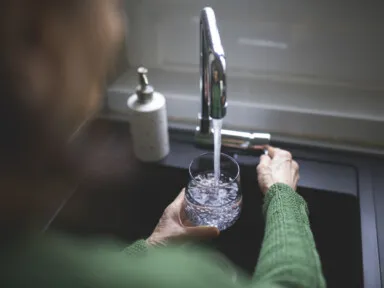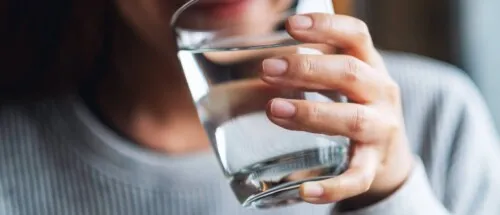Dive into the best water purifying options for your home
Clean, clear water is vital for a healthy household. We use it to brew our morning coffee, wash our clothes and dishes, water our houseplants, and rinse off after a long day. With water at the heart of what makes a house a home, you want to make sure yours is the best quality it can be.
There are many types of water treatment available for homeowners, but what is the best option for you? Here at LeafHome, we have your best interests at heart and the know-how to guide you to the right choice based on your home’s unique needs.
In this article:
Maybe you are looking to tackle hard water or maybe you just want to remove that rotten egg smell from your water. Whatever your needs, read on to learn all about your options.
- What is a Water Filter
- What is a Water Softener
- Differences Between Water Filters vs Water Softeners
- When to Use a Water Filter
- When to Use a Water Softener
- Can You Use Water Filters and Water Softeners Together?
What is a Water Filter?
Water filtration systems are simple ways to rid water of suspended contaminants and chemicals like certain metals, bacteria, sediments, and chlorine. These filters work by forcing water through some sort of barrier that can be made of charcoal, a fine mesh, or other semi- permeable material that traps the debris and allows clean and clear water to pass through.
Filters come in all shapes and sizes, too. You can easily attach one to your faucet for better drinking and cooking water, or, if you want clearer water throughout your entire home, larger filtration systems can be added to the central water supply.
What is a Water Softener?
Water softeners, just like water filters, improve water quality, but they target more specific contaminants and work differently. If your water tends to stain pots and pans or cause mineral deposits in appliances like coffee makers and washing machines, you might have what’s called hard water. Hard water is filled with minerals like calcium and magnesium, and while these are technically safe to drink, they can create scale, which is what stains and gums up appliances.
Water softeners take the “hard” out of the water by using something called ion exchange resin, thousands of tiny charged beads that attract the unwanted minerals in your water. So, instead of creating a fence to stop unwanted guests, water softeners are more like a magnet that pulls those impurities away.
Differences Between Water Filters vs Water Softeners
While the end result of both water filters and water softeners can be similar, there are plenty of distinctions to consider when deciding on which option is the right one for you.
Purpose and Functionality
Water filters are a more general solution to typical contaminants. They physically block larger particles with a barrier and allow the smaller water molecules to pass through. Water softeners, on the other hand, have specific targets, and they draw those contaminants out rather than simply blocking them. Both water management systems result in clearer, better water, but neither will catch all problems on their own.
Types of Contaminants Targeted
For sediment and other suspended pollutants, options like carbon filters are your go-to. The physical barrier of a water filter is great for trapping anything larger than the smallest particles and will serve most households well. Water softeners target specific minerals that water filters miss like dissolved calcium and magnesium.
Impact on Water Hardness
If you are looking to prevent staining and scale caused by mineral buildup, you’re going to need a water softening solution. Standard water filters simply are not designed to filter out these minerals. Water softeners, though, exist for this very reason, so the choice is clear if hard water is your primary issue.
Maintenance Requirements
Both water filters and water softening systems require regular maintenance. Water filters store the particles they block out, which ultimately wears down their effectiveness. Old filters can allow contaminants to pass through and can even become breeding grounds for bacteria and mold. Fortunately, replacing filters is often simple, so you only need to factor in the cost of the new filters.
Water softener maintenance is a bit more involved than simply replacing a filter. The resin beads need to be replaced regularly, and the process of extracting minerals often creates large amounts of wastewater that need to be dumped in an ecologically responsible manner. DIYers can handle these tasks, but experts might be necessary for some of the more complex tasks associated with maintaining a water softener like measuring out the correct amount of resin beads to cleaning brine tanks.
Cost Considerations
Since filters come in so many shapes and sizes and can easily adapt to fit your needs, they can be a much more affordable option. The initial installation of a faucet-style filter is quick and easy, but more complex whole-home filtration systems are more expensive to adopt and maintain. For example, some on-faucet filters can cost around $40 while whole house systems can be thousands of dollars to get started.
Water softeners, since they are often integrated into the home’s existing water system, are expensive to install and maintain. You can expect to spend thousands on the installation and then regular maintenance can cost hundreds of dollars a year.
When to Use a Water Filter
Most homes can benefit from water filters in some capacity. For instance, if you do not like the taste or smell of your water, a filtered pitcher might be all you need to get your home’s water to where you want it to be. If you notice that your shower heads get clogged easily, you might have a lot of sediment in your water, and may need a whole-home filtration system.
When to Use a Water Softener
If you notice scale buildup in your pipes and appliances, stains and spots on shower tiles or dishes, or if your skin and hair feel “dry” after washing, you may have hard water. For that, you’ll need a water softener. Traditional water filters are not engineered to remove the minerals in hard water, so a more targeted solution is necessary.
Can You Use Water Filters and Water Softeners Together?
Benefits of Combining Both Systems
The good news is that you do not have to settle for the benefits of just one of these systems. You can absolutely use both water filters and water softeners together to maximize the quality of your water. Some systems combine both cleaning methods into one unit to save space and make maintenance more convenient. For homes with hard water and a concern about contaminants, going with both a water filter and a water softener is a good idea.
Potential Challenges and Considerations
Of course, the greatest challenge with going with options comes down to costs and maintenance. Even with combo systems, you will need to regularly replace filters and handle the waste water and replacement resin beads.
The choice between water filters and softeners will always come down to your home’s specific needs. For generally cleaner water, filters are hard to beat, but if you are wrestling with hard water, you’ll need to consider water softeners. Regardless of what you pick, LeafHome is here to help guide you through the ends and out of keeping you home happy and healthy.
Frequently Asked Questions (FAQs)
Will a water filter soften water?
Most standard water filters are not formulated to rid water of scaling agents like calcium and magnesium.
Which is better, a water softener or a water filter?
The decision between a filter or a softener depends entirely on your home’s needs. Filters will purify water of sediments and other contaminants while softeners will help treat hard water.
Does a whole house water filter replace a water softener?
Even a system as robust as a whole house water filter will still not replace a water softener. Removing the scaling agents from hard water requires a special process most filtering systems do not offer on their own.
What are the disadvantages of a water softener?
Typical water softeners require regular maintenance and also produce brine, salty water that needs to be responsibly disposed of. This process can be time-consuming and expensive, especially when considering the upfront installation costs.
How do I know if I need a water filter or a water softener?
Water filters help with water that may taste and smell a little funky. Also, if you notice sediment in your water, filters can help with that, too. Water softeners tackle hard water specifically. You know if you have hard water if you notice staining on shower tiles or dishes or the discolored buildup of scale on appliances like washers.



